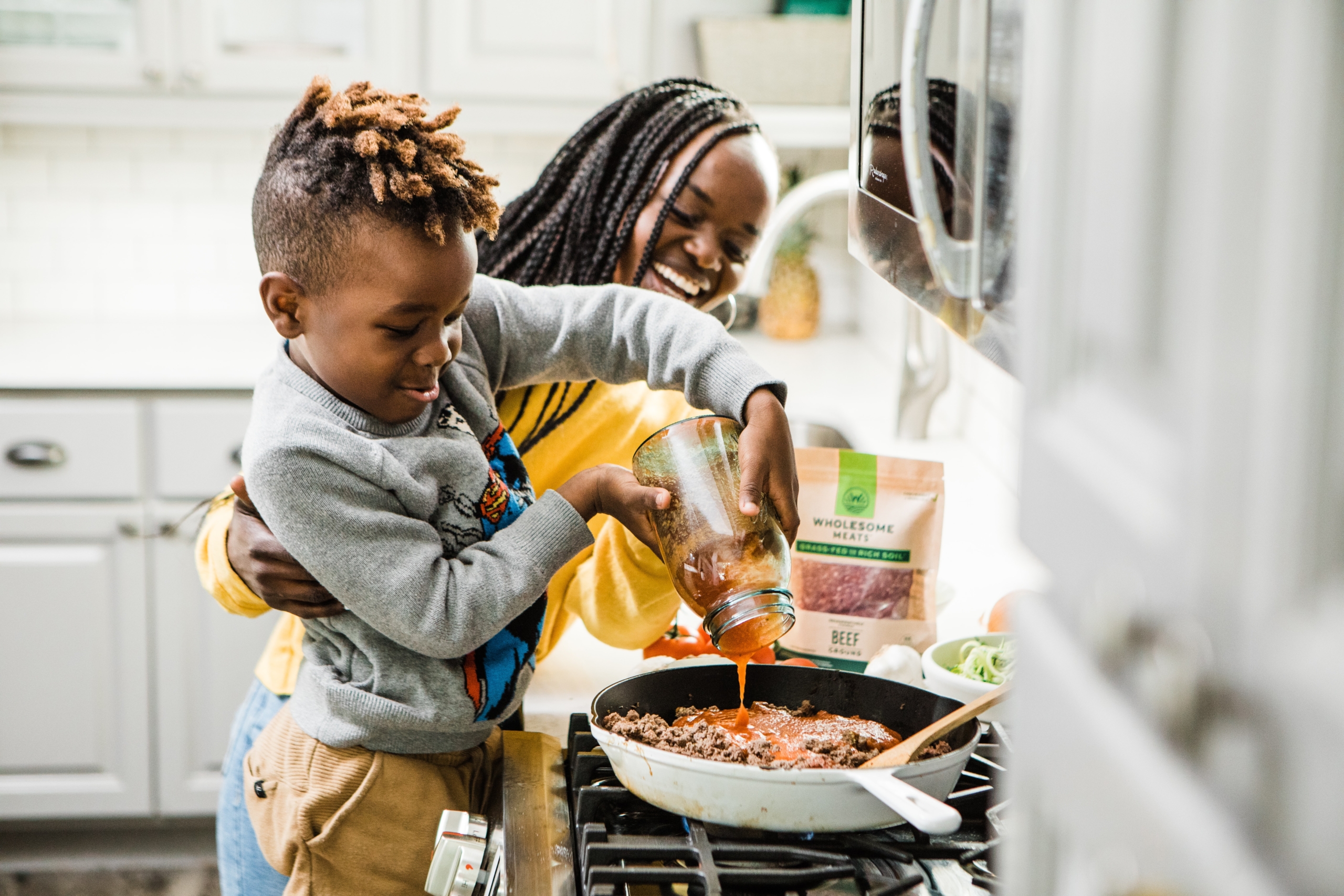What’s so magical about family mealtime?
We all know food is important for our physical health, but as I mentioned in my previous blog, the context in which we eat is equally important for our overall well-being. And, as we slowly emerge from a year and a half of loss, disconnection, disruption and anxiety, it’s a good time to reflect on what we’ve learned and what might be worth holding on to.
Some parents may be emerging with a new appreciation of eating together as a family. Understandably, others may be feeling exhausted following the additional meal preparation during this time. If you’re one of the latter, take heart! Family mealtimes are beneficial for mind, body and soul. In fact, few family experiences offer such a wide range of health benefits.
Body benefits
Several studies have shown that regular family meals are strongly associated with increased consumption of fruits, vegetables, and grains in children and teens. For example, a recent study showed that teens who ate with family were more likely to consume more fruits and vegetables.
Not only that, but family meals are an excellent opportunity for parents and care-givers to role model eating. Parents and other adults involved in caring for children can help model eating when hungry, eating a variety of foods, tasting new foods and stopping when full.
Mind magic
Family meals help young children acquire new language and develop their literacy skills. They are an opportunity for a parent or sibling to speak to an infant or toddler, and help them learn words, understand language and build conversation. Research suggests dinnertime conversation boosts vocabulary in young children more than being read aloud to. In this study, researchers counted the number of rare words – those not found on a list of 3,000 most common words – that families used during dinner conversation. Young children learned 1,000 rare words at the dinner table, compared to only 143 from parents reading storybooks aloud. Kids who have a large vocabulary read earlier and more easily and this may help them do better at school.
Canadian researchers followed a group of children from infancy through childhood, and found children with positive family meal experiences at age 6 showed a range of positive mental health benefits by age 10 including lower physical aggression, oppositional behaviour, and delinquency. Children who eat with family also have lower rates of depression, anxiety and eating disorders. A 2015 review, found frequent family dinners were associated with less disordered eating, alcohol and substance use, violent behaviour, and feelings of depression or thoughts of suicide in adolescents. They also noted a positive relationship between frequent family meals and increased self-esteem and school success. Eating as a family can help children feel more confident in themselves. By encouraging your children to talk about their day (and genuinely listening to their responses), you’re communicating that you value and respect who they are. Shared mealtimes boost children’s self-image, sense of security, and self-esteem. Family meals also give parents an opportunity to be aware of their children’s moods, behaviours and activities with friends.
And the mental health benefits may not just apply to kids. Even though family mealtime demands time and resources to plan, prepare, serve and clean up afterwards, this study found that having frequent family meals is associated with better mental health for both mothers and fathers. Compared with parents who rarely ate family meals, parents who regularly ate with their kids reported higher levels of family functioning, greater self-esteem and lower levels of depressive symptoms and stress.
Soul food
Of course, the real power of family mealtime depends on the mealtime atmosphere. Sharing a meal likely won’t provide positive benefits if mealtime is unpleasant with parents shouting at each other or their kids, or if everyone sits glued to the television, or hand-held devices in silence.
When family mealtime is positive, it also contributes a sense of family unity and identity. Family meals offer an opportunity to transmit the values and attitudes of a family from one generation to the next. Children can learn from parents and grandparents about what values are important to the family. They are also a wonderful way to link younger family members with their cultural and ethnic heritage, as differing foods may reflect the unique cultural traditions or ethnic tastes of a particular family’s background.
And remember, since it’s the atmosphere and conversation at the family dinner table that creates the magic, you don’t need to spend hours preparing the family meal.
Family mealtime – an intangible heirloom
And just when you thought family meals couldn’t possibly provide more value, they seem to. When children grow up having regular family meals, they are much more likely to do so in their own homes when they become parents. One study showed adults who reported having had six to seven family meals a week as a child went on to have regular family meals with their own children.
Tips for family mealtimes:
- make family meals a priority as often as you can each week.
- encourage your kids to help before and after a meal, whether setting the table, cooking or serving the food, and cleaning up. This helps relieve mum and dad of some of the burden and helps build important life skills.
- maximize the time you have together by encouraging positive conversation, adjusting meal experiences to the family’s needs, enjoying one another’s company and creating a warm and relaxed setting. Save disciplining or difficult conversations for a time away from the dinner table.
- share stories, and laugh together, take time to talk about the day’s events and decompress. Start with a few open-ended questions, like, “What was the highlight of your day?” or “What went well today?” Apart from the benefits of conversation already mentioned, when there is plenty of conversation, we tend to eat more slowly, allowing our brains time to register fullness and signal that it’s time to stop eating.
- Make sure the television is off and all electronic devices are well away from the table. That way, you’ll encourage conversation and mindful eating.
The bottom line
Eating meals together might just be the ultimate parenting hack. What else can you do in an hour that will improve your children’s language and communication skills, increase their self-esteem, improve their physical health and reduce their risk of depression, alcohol and substance abuse? The family meal and its benefits may be one heirloom you want to pass along to future generations.
Ready to take the next step? Contact me and request a complimentary call to find out more about Intuitive Eating and how it can help you truly nourish yourself and your family– body, mind and soul.






